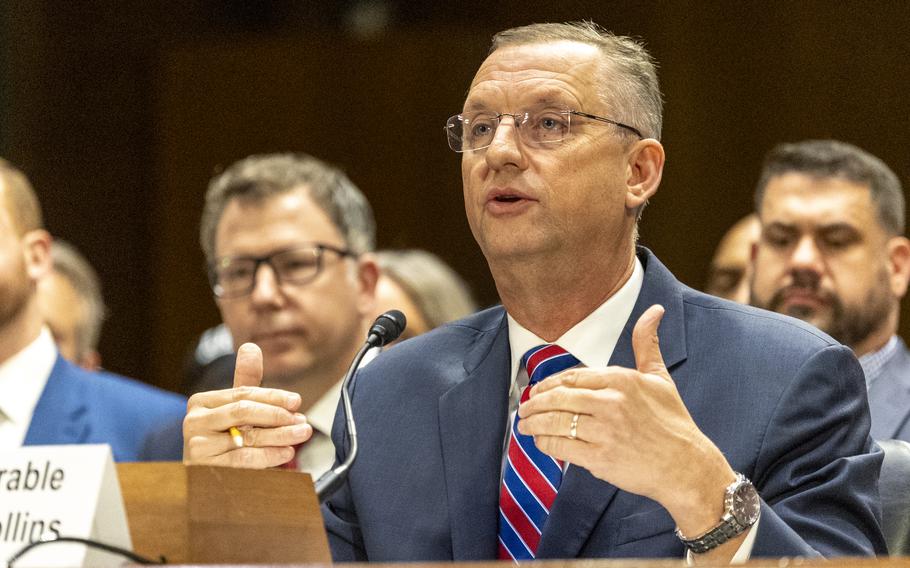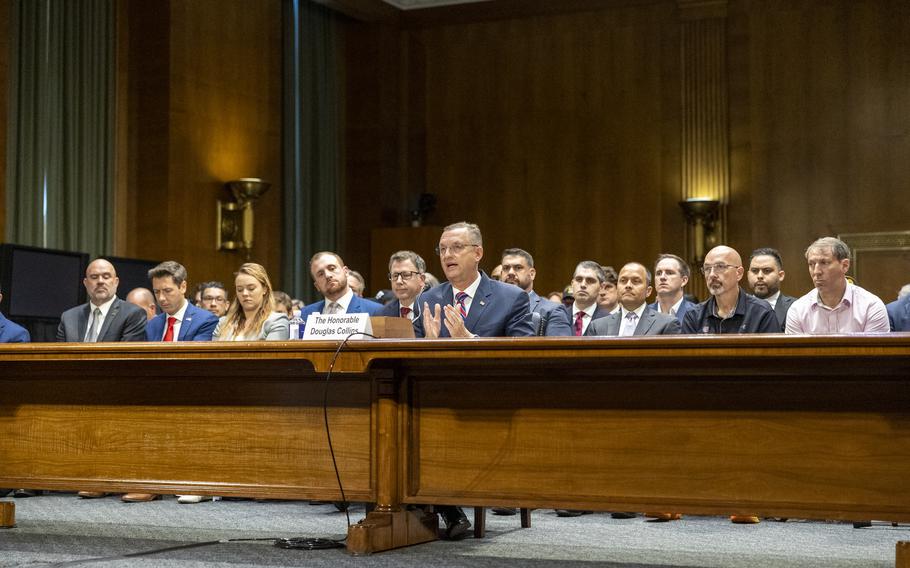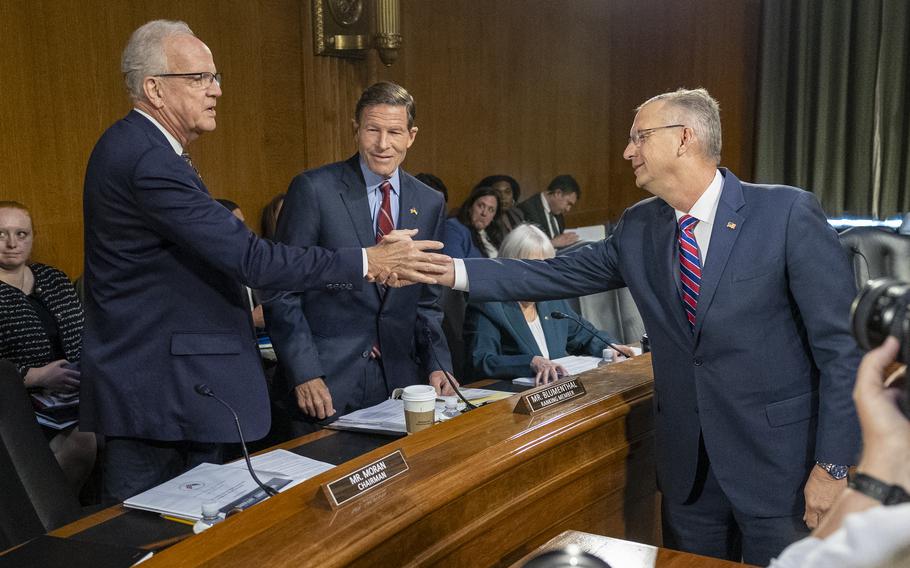
VA Secretary Doug Collins testifies Tuesday, May 6, 2025, in Washington during a hearing of the Senate Committee on Veterans’ Affairs. The hearing focused on the future of the VA, as Collins defended his management of the huge agency from critical questions by Democratic senators on the committee. (Eric Kayne/Stars and Stripes)
WASHINGTON (Tribune News Service) — New Veterans Affairs Secretary Doug Collins faced tough questions on Tuesday about his plans to lay off 70,000 to 80,000 employees and speed up the nationwide deployment of a troubled computerized patient medical record system that first launched in 2020.
Washington Sen. Patty Murray grilled Collins about a lack of transparency under his leadership, including a new policy that prevented her from meeting with veterans and health care providers at a Seattle VA hospital in April. She also questioned his goal of cutting 15% of the department’s workforce while accelerating the rollout of the electronic health record system that has hamstrung Spokane’s Mann-Grandstaff VA Medical Center since it became the testing ground at the end of the first Trump administration.
“As you know, fixing EHR and getting it right for our veterans is about patient safety,” Murray said, using the acronym for the system. “Did you ask these VA clinicians and hospitals about how those cuts would affect future EHR deployments?”
Collins replied that the planned layoffs and the computer system’s accelerated rollout “are separate,” disagreeing with concerns about cutting staff and terminating support contracts while more aggressively deploying a system that has contributed to thousands of cases of patient harm, according to the VA’s own internal data.
Ken Kizer, who ran the Veterans Health Administration during the 1990s and oversaw the last major overhaul of VA health care, has said it would be “lunacy” to ramp up the system’s rollout while conducting mass layoffs.
Sen. Marsha Blackburn, R-Tenn., said she was concerned that VA employees were refusing to show up for trainings and to use the new system, asking Collins how he would deal with such resistance to the system, which the Trump administration purchased for $10 billion in 2017 from Cerner, a company that has since been acquired by the tech giant Oracle.
Collins told Blackburn that when he started learning about the beleaguered project, he found an attitude at the VA that he described as, “We’re not going to do anything and we’re going to make it all individualized.” Meanwhile, he said, Oracle had the attitude that “We could just finish this in a short amount of time.”
“So what we’ve done is we’ve actually now put the onus back on Oracle to actually, you know, provide what they’re supposed to provide,” Collins said. “And we’ve also cut down, on our side, the amount of delay that was caused in — that really caused the initial problems in the rollout, where we had six different locations doing six different things. So we’ve taken eight or nine committees that were all having to touch stuff before they could get back to a decision and cut that down to one committee that can then communicate directly with Oracle to get this started.”

VA Secretary Doug Collins testifies Tuesday, May 6, 2025, in Washington during a hearing of the Senate Committee on Veterans’ Affairs. The hearing focused on the future of the VA, as Collins defended his management of the huge agency from critical questions by Democratic senators on the committee. (Eric Kayne/Stars and Stripes)
The committees Collins referred to were composed of doctors with expertise in different aspects of medical care, who reviewed proposed changes to the complex computer system. It is unclear how a single committee, intended to streamline the system’s development, will address the numerous concerns identified by users in Spokane, Walla Walla and the four other VA hospitals that have since adopted the system.
Sen. Jerry Moran, a Kansas Republican who chairs the Senate VA Committee, opened the hearing by saying that many of the panel’s members have concerns about the plan Collins announced in March to slash the department’s workforce to comply with an executive order President Donald Trump signed. Rather than cutting a predetermined number of jobs, Moran said, Collins should “right-size” the VA workforce.
Sen. Richard Blumenthal of Connecticut, the panel’s top Democrat, then expressed similar concerns with a series of sharp questions that Collins largely evaded.
“Improvement is absolutely necessary, but it shouldn’t be done with a chain saw,” Blumenthal said, warning that mass layoffs could be “a self-inflicted wound” for the VA.
Collins responded by saying that only about 1,000 of the department’s more than 470,000 employees had been laid off, excluding most of the “probationary” VA workers who were arbitrarily fired as part of Trump adviser Elon Musk’s early effort to slash the federal workforce. The secretary said that simply adding more employees hadn’t fixed the VA’s woes and emphasized that his goal of cutting 15% of staff may not actually happen.
In a testy exchange with Sen. Maggie Hassan, D-N.H., Collins suggested the idea that the VA will cut jobs and services is “a nice talking point, but we’ve not done it yet.”
“It’s your talking point,” Hassan said incredulously, to which Collins responded, “It is our goal. A goal is not a fact.”
Republicans on the committee largely avoided criticizing Collins, but Moran gently reminded the secretary that the VA needs to replace its inspector general, whom Trump summarily fired in January without following a law that requires a president to notify Congress and give a rationale for such a move.
After Moran questioned why a new inspector general hadn’t been appointed, Collins said the next step would be Trump nominating a replacement for Mike Missal, the former top watchdog who, along with other inspectors general who were fired in January, has filed a lawsuit challenging their mass termination.

Sen. Jerry Moran, R-Kan., left, greets VA Secretary Doug Collins before Collins testifies May 6, 2025, in Washington at a hearing of the Senate Committee on Veterans’ Affairs. (Eric Kayne/Stars and Stripes)
© 2025 The Spokesman-Review (Spokane, Wash.).
Visit www.spokesman.com.
Distributed by Tribune Content Agency, LLC.